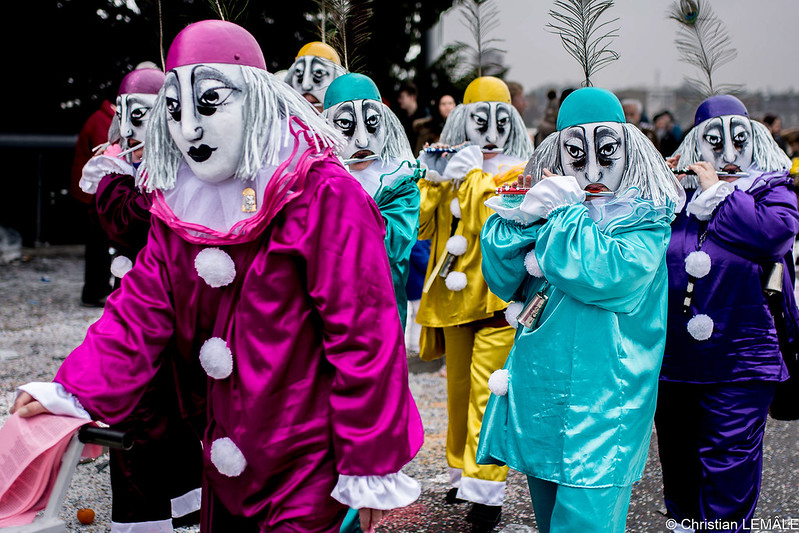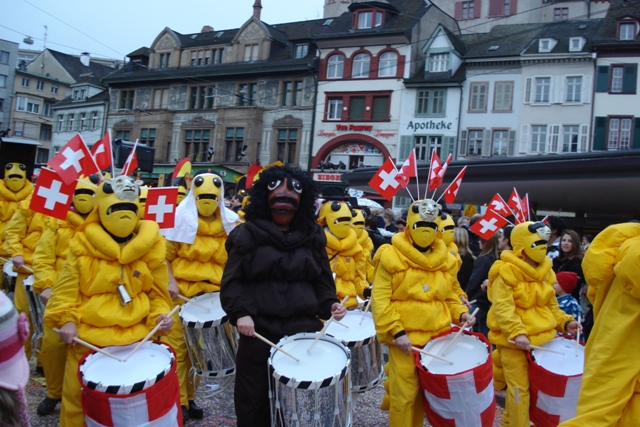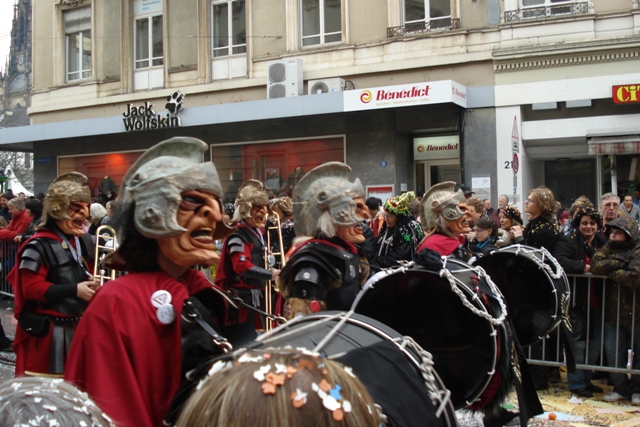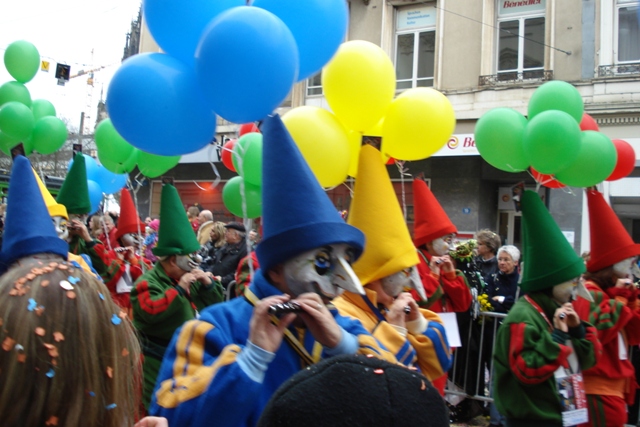Basel Carnival
Three Days of Midnight Magic, Masks, and Music
2026/02/22 - 2026/02/25
The Basel Carnival (Fasnacht) is Switzerland’s largest traditional carnival, held every spring in Basel, where the city is transformed by masks, lanterns, music, and confetti.
Every spring, the city of Basel is enveloped in the dreamlike energy of Fasnacht. For exactly 72 hours, the medieval streets are filled with masked musicians, giant lanterns, and confetti, drawing over 200,000 visitors from around the world. Whether you’re a night owl, a tradition lover, or someone seeking a sensory feast of Swiss culture, Basel Carnival is an experience you’ll never forget.
Before dawn in March, all the city lights go out and thousands of hand-painted lanterns glow to life. The sound of piccolos and drums echoes through the narrow alleys, confetti crunches underfoot... For three days, Basel becomes a living work of art.
Main Attractions
Morgestraich: The Magical 4 a.m. Start
The festival begins at exactly 4:00 a.m. on Monday with Morgestraich, when all city lights are extinguished and over 200 “cliques” (carnival groups) parade through the old town with handmade lanterns, masks, and instruments. The only light comes from the lanterns, and the haunting melodies of piccolos and drums create an otherworldly atmosphere.
Cortege Parades & Guggemusik
On Monday and Wednesday afternoons, the grand Cortege parades wind through the city. Thousands of masked participants throw confetti, hand out candies and oranges, and perform satirical skits from floats. Guggemusik (costumed brass bands) fill the city with lively tunes, and the crowds scramble for treats and confetti.
Lantern Exhibition & Schnitzelbank
After Morgestraich, lanterns are displayed in Münsterplatz, where you can admire their detailed artwork and satirical designs. In the evenings, local singers perform Schnitzelbank—humorous, satirical songs about current events, accompanied by illustrated placards.
Costumes and Decorations
Participants wear “Larve” masks, transforming into grotesque faces, animals, or politicians. The city is blanketed in confetti, and shop windows are protected and decorated with carnival-themed boards. The tactile feel of masks, confetti, and lantern light is a sensory highlight.
Traditional Food & Drink
Festival staples include Mehlsuppe (flour soup), Zwiebelwähe (onion tart), and Fastenwähe (caraway bread). Cafés and cellars serve mulled wine, beer, and sweets late into the night, while the aroma of roasted onions, fresh bread, and spices drifts through the chilly air.
Cultural and Historical Background
The history of Basel Carnival is ancient, with records dating back to the “Bloody Monday of Basel” in 1376. Originally a Catholic carnival held before Lent, it was celebrated with great fanfare. However, after the Reformation in the 16th century, when much of Switzerland became Protestant and many carnivals were banned, Basel’s festival survived in its own unique form.
What makes Basel Carnival unique is that it starts at 4 a.m. on the Monday after Ash Wednesday—a blend of Protestant tradition and Catholic heritage found nowhere else in Switzerland. The festival lasts exactly 72 hours, during which citizens use masks, lanterns, satire, and music to freely criticize society and politics, turning the city into a stage for creative expression.
Since the 19th century, new elements such as floats, Guggemusik (costumed brass bands), and Schnitzelbank (satirical songs) have been added, shaping the modern, artistic carnival we see today. In 2017, “Basel Fasnacht” was inscribed on UNESCO’s Intangible Cultural Heritage list, becoming a symbol of civic pride, identity, and creativity.
For Basel residents, Fasnacht is a rite of passage, passed down through generations, and a time for community bonding and free expression. For visitors, it’s a rare chance to experience Swiss history, society, and satirical culture up close.
Participant Voices
The feeling of standing in the dark at 4 a.m. for Morgestraich is unforgettable. The music, the lanterns—I felt like I was part of centuries of history.
Fun Facts
- During Morgestraich, by law, all city center lights must be turned off.
- Confetti is sold only in single colors—mixed confetti is considered bad luck.
- It is the only Protestant carnival of its kind in the world.
Festival Dates
The Basel Carnival starts at 4 a.m. on the Monday after Ash Wednesday every year. Immerse yourself in lanterns and music at midnight, and experience the magic of Switzerland’s greatest carnival.
The event schedule is subject to change. Please check the official website for the most up-to-date information.
Information
| Name | Basel Carnival |
| Country | Switzerland |
| Area | Basel |
| Date | 2026/02/22 - 2026/02/25 |
| Link |
Upcoming Festivals
New Orleans Mardi Gras United States
A Kaleidoscope of Culture, Color, and Carnival
2026/02/16Shrovetide Football United Kingdom
Two Days of Intense Chaos Echoing Through Ashbourne
2026/02/16Užgavėnės (the time before Lent) Lithuania
Lithuania’s Joyful Carnival to Chase Away Winter
2026/02/18The Miao Flower Mountain Festival China
A Vibrant Celebration Weaving Love, Tradition, and Nature
2026/02/20Hadaka Matsuri Japan
A Test of Luck, Heat, and Brotherhood in Okayama
2026/02/21Abu Simbel Sun Festival Egypt
Ancient Light and Miracles on the Banks of the Nile
2026/02/22Tirnavos Carnival Greece
Greece’s Most Outrageous Festival of Color, Satire, and the Explosive Phallus Celebration
2026/02/22Basel Carnival Switzerland
Three Days of Midnight Magic, Masks, and Music
2026/02/23Fiesta Nacional del Sol Argentina
San Juan’s Festival of Light, Culture, and Community
2026/02/24Perfume Pagoda Festival Vietnam
A pilgrimage festival filled with prayers and the breath of spring-Vietnam’s largest pilgrimage celebration.



